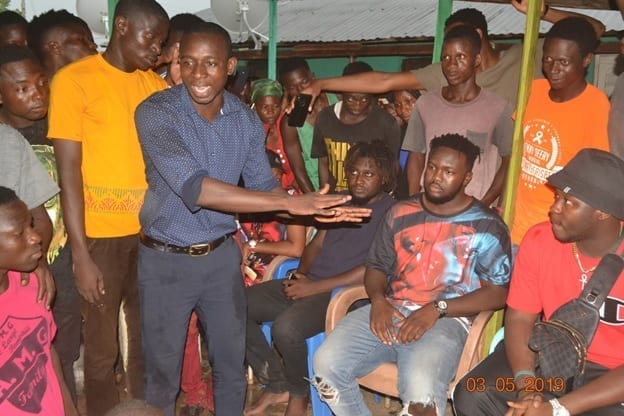Seidu (standing middle) introducing Medikal (seated middle) at the Sawla Chief’s palace.[/caption]
The departure terminal for local flights at the Kotoka International Airport was buzzing with activity as scores of passengers went through check-in procedures. Ghanaian musician Samuel Adu Frimpong, popularly known as Medikal, and his crew had missed their morning flight to Tamale and were hoping to be booked on another flight. The artist was billed to headline a major concert later that evening in Sawla within the newly-created Savannah Region, a three-hour drive from Tamale.
After the last boarding call to Tamale was made, the manager of the artist tried a last minute desperate appeal to get the crew onboard but was unsuccessful. He quickly called to inform the main event organiser, Banasco Nuhu Seidu, who had been waiting at the Tamale airport, that they couldn’t make it.
Seidu’s reputation was on the line. In spite of his assurances, many of the youth in Sawla had been skeptical that such a major artist from Accra would come to their part of the world to perform. The concert was meant to herald Seidu’s official announcement to contest the parliamentary seat of the Sawla-Tuna-Kabla Constituency. At 29 years, Seidu faces a huge challenge to make it through the primaries to represent the New Patriotic Party (NPP) as its candidate for the elections. His campaign had just suffered its first major setback as he was left with no choice but to cancel and reschedule the show.
One week later, Medikal and his team entered Sawla amidst great celebrations. A welcome party of young men riding motorcycles with daring stunts led the way while hundreds of fans lined the streets to catch a glimpse of the star, screaming his name and waving at his passing convoy. There was great excitement in the town and high expectations for the concert, which was being held at an open-air venue
Two hours to show time, scheduled at 7pm, a heavy downpour began and continued well after 9pm when it slowed into a drizzle. The show managed to start at about 10pm with only a fraction of the expected turn-out. Once again, Seidu was disappointed but comforted that he delivered on his promise to bring the big-name artist to Sawla.
As the 2020 general elections draw close and political parties gear up for their primaries to elect candidates to represent them in parliamentary elections, would-be contenders like Seidu are positioning themselves to contest. He is one of two young politicians in the Northern parts of the country hoping to make it into parliament.
Seidu intends to anchor his campaign on the back of the youth in his constituency and is confident if he connects very well with them they would boost his efforts at gaining political power.
“Gradually our people, especially, the young ones, are being enlightened because of education and exposure and I believe they can decipher who has what it takes to better represent them and make an impact in their lives,” Seidu said.
Paul Sugle, a hotel-manager in Sawla, explained that Seidu, through an NGO he helped to establish with the support of some Spanish donors, has over the years opened over eight ICT laboratories in various schools, initiated a bee-keeping project for women and opened a girls-club to empower young girls. He said these social projects, along with Seidu’s very affable personality, endear him to many people in the constituency.
“The youth really hold him in high esteem and everywhere you go people love him,” said Sugle. “Being a young man and having done so much for his community out of the reach of political power is truly great.”
[caption id="attachment_127188" align="alignnone" width="624"]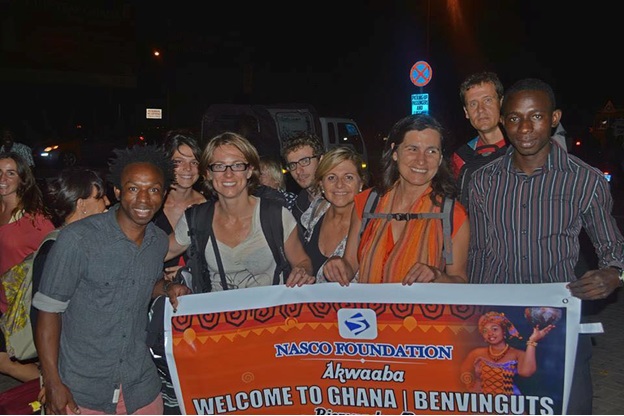 Seidu (far right) welcoming volunteers from Spain for his NGO projects in Sawla[/caption]
Seidu said his work in the community over the past decade was never motivated by politics. His decision to contest the parliamentary seat only began to form last year after appeals by some members of the community.
“I grew up seeing how lack of opportunities affected people,” said Seidu. “Many young people either went down South to find work or tried to cross the desert into Europe, including my own brother.”
Born in Fiaso, a small farming community near Techiman, he had to rely on his wit and effort to progress in life. At an early age, he had to make the decision to go to school and remain hungry, or follow his parents to the farm where he was assured of food. He chose the former and was teased for being weak and lazy by his friends who chose to go to the farm. He pressed on and continued his Junior High School (JHS) education at St. Augustine RC in Sawla after which he progressed to Tamale Senior High School in 2003 and then the University of Ghana in 2008 where he majored in Political Science. He was the first ever student from his JHS to attend the University of Ghana.
As he prepares to launch his campaign, Seidu knows too well that one major challenge will be funding. Like many people he believes that politics has become too monitised in Ghana, which is not good for the country’s democracy.
“When money talks, the truth is silent,” said Mark Nuhu, a longtime assemblyman and now chief of the small village of Gbongbondori in the Sawla-Kalba-Tuna constituency. “Our elections have become hand-go-hand-come and it is difficult for people without resources to contest.”
Nuhu said that young people like Seidu must seek out influential supporters to back their campaign or devise interesting strategies to raise funds, particularly for internal party elections. He explained that until a person wins the primaries and becomes the official candidate of the political party in the constituency, he/she will not get support from the party or individual financiers while contesting in the primaries.
One major strategy Seidu and his team are adopting to raise funds for some campaign-related activities involving social projects is to hold a number of musical concerts in the constituency featuring popular artists. The first concert, featuring Medikal, was designed as a charity concert to raise funds for breast cancer treatment. Part of the revenue generated from the concert was meant to be donated to the local hospital. Though the concert wasn’t successful in generating funds, Seidu believes that the strategy is still viable and plans to hold other concerts.
Seidu is also confident that through the concerts he would be creating excitement around his candidature while involving the youth to pool resources together for development projects. He is quick to add that whatever resources he raises is not meant to influence voters directly but to invest in sustainable projects that will benefit the community in the long run.
[caption id="attachment_127189" align="alignnone" width="624"]
Seidu (far right) welcoming volunteers from Spain for his NGO projects in Sawla[/caption]
Seidu said his work in the community over the past decade was never motivated by politics. His decision to contest the parliamentary seat only began to form last year after appeals by some members of the community.
“I grew up seeing how lack of opportunities affected people,” said Seidu. “Many young people either went down South to find work or tried to cross the desert into Europe, including my own brother.”
Born in Fiaso, a small farming community near Techiman, he had to rely on his wit and effort to progress in life. At an early age, he had to make the decision to go to school and remain hungry, or follow his parents to the farm where he was assured of food. He chose the former and was teased for being weak and lazy by his friends who chose to go to the farm. He pressed on and continued his Junior High School (JHS) education at St. Augustine RC in Sawla after which he progressed to Tamale Senior High School in 2003 and then the University of Ghana in 2008 where he majored in Political Science. He was the first ever student from his JHS to attend the University of Ghana.
As he prepares to launch his campaign, Seidu knows too well that one major challenge will be funding. Like many people he believes that politics has become too monitised in Ghana, which is not good for the country’s democracy.
“When money talks, the truth is silent,” said Mark Nuhu, a longtime assemblyman and now chief of the small village of Gbongbondori in the Sawla-Kalba-Tuna constituency. “Our elections have become hand-go-hand-come and it is difficult for people without resources to contest.”
Nuhu said that young people like Seidu must seek out influential supporters to back their campaign or devise interesting strategies to raise funds, particularly for internal party elections. He explained that until a person wins the primaries and becomes the official candidate of the political party in the constituency, he/she will not get support from the party or individual financiers while contesting in the primaries.
One major strategy Seidu and his team are adopting to raise funds for some campaign-related activities involving social projects is to hold a number of musical concerts in the constituency featuring popular artists. The first concert, featuring Medikal, was designed as a charity concert to raise funds for breast cancer treatment. Part of the revenue generated from the concert was meant to be donated to the local hospital. Though the concert wasn’t successful in generating funds, Seidu believes that the strategy is still viable and plans to hold other concerts.
Seidu is also confident that through the concerts he would be creating excitement around his candidature while involving the youth to pool resources together for development projects. He is quick to add that whatever resources he raises is not meant to influence voters directly but to invest in sustainable projects that will benefit the community in the long run.
[caption id="attachment_127189" align="alignnone" width="624"]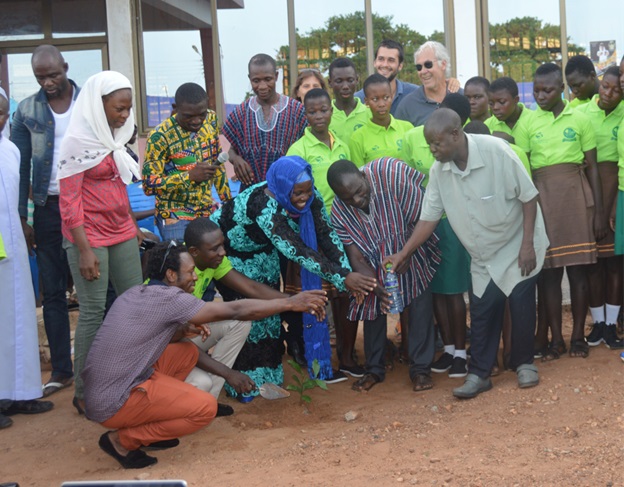 Seidu in a tree-planting project in Sawla[/caption]
A bold decision to run for MP in Wa Central
An hour’s drive away from the Sawla Township is the Wa Central Constituency in the Upper West regional capital of Wa, where another young aspirant, Dr. Mahmoud Khalid, 30, is hoping to oust longtime Member of Parliament (MP) Hon. Rasheed Pelpuo. Khalid faces an uphill task challenging the sitting MP who is an experienced politician and a senior figure in the National Democratic Congress (NDC).
[caption id="attachment_127193" align="alignnone" width="624"]
Seidu in a tree-planting project in Sawla[/caption]
A bold decision to run for MP in Wa Central
An hour’s drive away from the Sawla Township is the Wa Central Constituency in the Upper West regional capital of Wa, where another young aspirant, Dr. Mahmoud Khalid, 30, is hoping to oust longtime Member of Parliament (MP) Hon. Rasheed Pelpuo. Khalid faces an uphill task challenging the sitting MP who is an experienced politician and a senior figure in the National Democratic Congress (NDC).
[caption id="attachment_127193" align="alignnone" width="624"]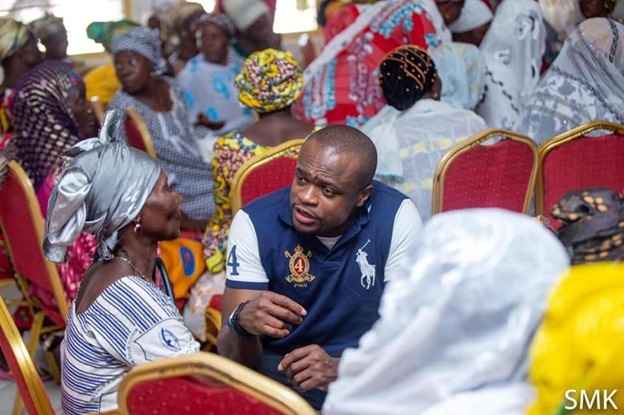 Khalid speaking with a constituency member at an interactive session[/caption]
Unlike Seidu, Khalid was born into a middle-class political family. His father is a strong member of the NDC in the Upper West Region and served as Regional Minister from 2009- 2011. Khalid’s political ambitions were nurtured from an early stage. In 2006, he was elected senior prefect of his secondary school, T.I Ahmadiyya, Kumasi. He proceeded to University of Cape Coast where he was elected president of the Students’ Representative Council (SRC) in 2010.
After his first degree he left for Robert Gordon University in Scotland to pursue a Masters in Energy Management. He then went on to the Henley Business School where he received a PHD in Accounting and Financial Management in 2016 at a relatively young age of 27and got a job as a lecturer at the University of Sheffield, becoming the youngest faculty member in his department where he still lectures.
“Dr. (Khalid) is one of our brightest stars,” said Fadulilah Froko, an indigene of Wa. “His solid personal achievements at such a young age have conferred some dignity on him and he is respected by the youth and the adults.”
Khalid said his decision to contest is a very bold move as some people think he is moving too fast and must “wait his turn”. A close uncle of his who had contested in the primaries against Pelpou in the 2016 elections may still have been interested in contesting again. This created an uncomfortable situation in the family where both uncle and nephew could potentially have been competing against each other.
“I received an avalanche of opposition by way of advice not to run,” Khalid said. “And I probably wouldn’t have if he (Uncle) had openly declared his intention to run.”
[caption id="attachment_127194" align="alignnone" width="624"]
Khalid speaking with a constituency member at an interactive session[/caption]
Unlike Seidu, Khalid was born into a middle-class political family. His father is a strong member of the NDC in the Upper West Region and served as Regional Minister from 2009- 2011. Khalid’s political ambitions were nurtured from an early stage. In 2006, he was elected senior prefect of his secondary school, T.I Ahmadiyya, Kumasi. He proceeded to University of Cape Coast where he was elected president of the Students’ Representative Council (SRC) in 2010.
After his first degree he left for Robert Gordon University in Scotland to pursue a Masters in Energy Management. He then went on to the Henley Business School where he received a PHD in Accounting and Financial Management in 2016 at a relatively young age of 27and got a job as a lecturer at the University of Sheffield, becoming the youngest faculty member in his department where he still lectures.
“Dr. (Khalid) is one of our brightest stars,” said Fadulilah Froko, an indigene of Wa. “His solid personal achievements at such a young age have conferred some dignity on him and he is respected by the youth and the adults.”
Khalid said his decision to contest is a very bold move as some people think he is moving too fast and must “wait his turn”. A close uncle of his who had contested in the primaries against Pelpou in the 2016 elections may still have been interested in contesting again. This created an uncomfortable situation in the family where both uncle and nephew could potentially have been competing against each other.
“I received an avalanche of opposition by way of advice not to run,” Khalid said. “And I probably wouldn’t have if he (Uncle) had openly declared his intention to run.”
[caption id="attachment_127194" align="alignnone" width="624"]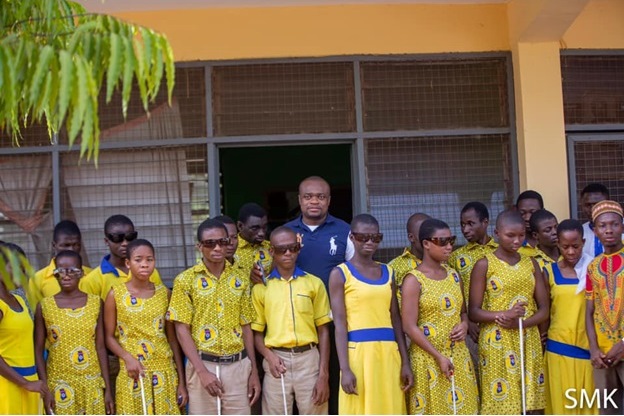 Khalid with students of Wa Methodist School For the Blind after donating some sun protector glasses, canes etc to the Institution[/caption]
The Wa Central constituency is traditionally a safe seat for the NDC who have won it since 1992. Thus the stakes are very high in the primaries as once elected, there is a very high chance of winning the seat in the general elections. Khalid said he had to be very tactful in making and announcing the decision to run. He courted the support of some other elders to give his candidature a strong backing.
Elvis Botah, Deputy National Youth Organiser of the NPP is all too familiar with contesting a renowned sitting MP. He unsuccessfully challenged the current Second Deputy Speaker of Parliament and MP for Nadowli West Constituency, Hon Alban Bagbin, in the 2016 general elections.
“As a young man contesting a very respected and older candidate you have to be very careful,” Botah said. “If you appear the slightest bit disrespectful you will lose favour among the community where respect for the elderly is very important.”
Though Botah didn’t win the election he said he believed he put up a good fight which has prepared the grounds for a possible victory in the 2020 elections. Khalid also said though he is going all out to win, in the unlikely case he doesn’t, he wouldn’t consider it as a loss but an important investment for subsequent elections.
Central to Khalid’s campaign is a drive to empower the youth. He said he seeks to style himself as a “solutions-oriented candidate” and not a “complaint- man.” Thus, he is rolling out a series of training programmes targeted at the youth to equip them with useful skills that can better their chances of employment or entrepreneurship.”
“I want to change the narrative of our politics and inspire a new paradigm where people don’t rely on the MP for handouts but are empowered and feel empowered enough to seize their destinies and take initiatives for their own good,” Khalid said.
[caption id="attachment_127195" align="alignnone" width="514"]
Khalid with students of Wa Methodist School For the Blind after donating some sun protector glasses, canes etc to the Institution[/caption]
The Wa Central constituency is traditionally a safe seat for the NDC who have won it since 1992. Thus the stakes are very high in the primaries as once elected, there is a very high chance of winning the seat in the general elections. Khalid said he had to be very tactful in making and announcing the decision to run. He courted the support of some other elders to give his candidature a strong backing.
Elvis Botah, Deputy National Youth Organiser of the NPP is all too familiar with contesting a renowned sitting MP. He unsuccessfully challenged the current Second Deputy Speaker of Parliament and MP for Nadowli West Constituency, Hon Alban Bagbin, in the 2016 general elections.
“As a young man contesting a very respected and older candidate you have to be very careful,” Botah said. “If you appear the slightest bit disrespectful you will lose favour among the community where respect for the elderly is very important.”
Though Botah didn’t win the election he said he believed he put up a good fight which has prepared the grounds for a possible victory in the 2020 elections. Khalid also said though he is going all out to win, in the unlikely case he doesn’t, he wouldn’t consider it as a loss but an important investment for subsequent elections.
Central to Khalid’s campaign is a drive to empower the youth. He said he seeks to style himself as a “solutions-oriented candidate” and not a “complaint- man.” Thus, he is rolling out a series of training programmes targeted at the youth to equip them with useful skills that can better their chances of employment or entrepreneurship.”
“I want to change the narrative of our politics and inspire a new paradigm where people don’t rely on the MP for handouts but are empowered and feel empowered enough to seize their destinies and take initiatives for their own good,” Khalid said.
[caption id="attachment_127195" align="alignnone" width="514"]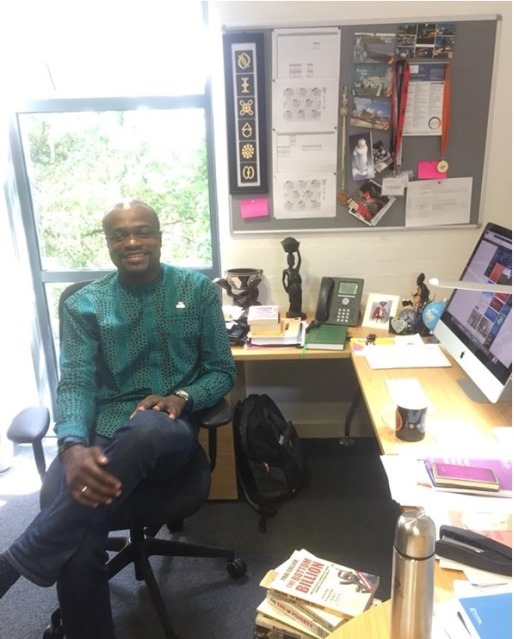 Khalid at work at the University of Sheffield[/caption]
Winning Through Social Media
Both Seidu and Khalid consider social media, particularly Facebook and Whatsapp, as very viable platforms to advance their youth-centric campaign strategies. Khalid, for example, officially announced his decision to contest the parliamentary seat on Facebook. Both candidates are very active on the platform.
“I certainly don’t have the money to erect giant billboards or pay for radio and television advertising, but I can run a cost effective and extensive social media campaign that can reach a lot of people,” Seidu said.
Social media is becoming a very important platform for campaigns all over the world and candidates are investing time and resources into developing the right strategies to effectively utilise the platform. Particularly for young politicians, it offers a great opportunity to reach the electorates.
“Social media is an equalizer,” said communications scholar and lecturer at the Ghana Institute of Journalism Dr. Etse Sikanku. “It gives young people without the network, experience and name recognition the ability to immediately level up on these indicators and more. Whether in networking, organising or persuasion, the medium opens itself up as an effective campaign platform.”
Dr. Sikanku notes that examples of the effective use of social media in elections can be seen in President Barak Obama’s 2008 campaign in the American elections, and French President Emmanuel Macron’s 2017 campaign. Both were considered relatively young at the time of contesting. He said those elections offer templates that may be possibly replicated in other democracies.
Seidu and Khalid may be a long shot away from a presidential campaign but they both intend to use social media as best as they can to enhance their chances in the elections. Both candidates also agree that the upcoming primaries present a great opportunity to launch their political careers and whether they win or lose, they would have registered their names in the minds of the electorates.
By Chief Moomen
The writer is graduate student at the Department of Communication Studies, University of Ghana, specialising in Print Journalism and Public Relations.
Email: [email protected] ]]>
Khalid at work at the University of Sheffield[/caption]
Winning Through Social Media
Both Seidu and Khalid consider social media, particularly Facebook and Whatsapp, as very viable platforms to advance their youth-centric campaign strategies. Khalid, for example, officially announced his decision to contest the parliamentary seat on Facebook. Both candidates are very active on the platform.
“I certainly don’t have the money to erect giant billboards or pay for radio and television advertising, but I can run a cost effective and extensive social media campaign that can reach a lot of people,” Seidu said.
Social media is becoming a very important platform for campaigns all over the world and candidates are investing time and resources into developing the right strategies to effectively utilise the platform. Particularly for young politicians, it offers a great opportunity to reach the electorates.
“Social media is an equalizer,” said communications scholar and lecturer at the Ghana Institute of Journalism Dr. Etse Sikanku. “It gives young people without the network, experience and name recognition the ability to immediately level up on these indicators and more. Whether in networking, organising or persuasion, the medium opens itself up as an effective campaign platform.”
Dr. Sikanku notes that examples of the effective use of social media in elections can be seen in President Barak Obama’s 2008 campaign in the American elections, and French President Emmanuel Macron’s 2017 campaign. Both were considered relatively young at the time of contesting. He said those elections offer templates that may be possibly replicated in other democracies.
Seidu and Khalid may be a long shot away from a presidential campaign but they both intend to use social media as best as they can to enhance their chances in the elections. Both candidates also agree that the upcoming primaries present a great opportunity to launch their political careers and whether they win or lose, they would have registered their names in the minds of the electorates.
By Chief Moomen
The writer is graduate student at the Department of Communication Studies, University of Ghana, specialising in Print Journalism and Public Relations.
Email: [email protected] ]]>
On the Road to Parliament: The story of two young politicians
Advertisement


